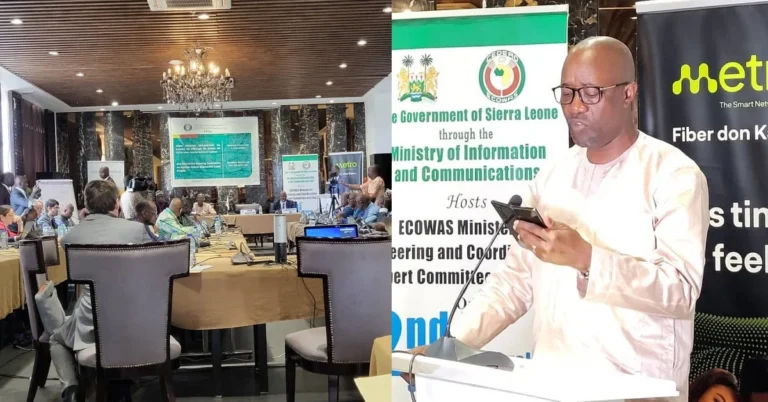APA – Lagos (Nigeria)
Freetown, the Capital of Sierra Leone is on Wednesday, April 5, 2023, hosting the 2nd Meeting of Ministers of Information and Communication Technology, ICT, and Digital Economy of ECOWAS Member States involved in the Amilcar Cabral submarine cable development project.
The ministerial meeting, which will take place after the meeting of experts holding on 3rd and 4th of April 2023, will consider the progress report on the project’s implementation, the finalisation of the technical options and in particular the signing of the project’s memorandum of understanding by the Ministers of the Member States, which is the key element of the event.
Six ECOWAS countries are involved in the Amilcar Cabral submarine cable development project, namely Cabo Verde, Gambia, Guinea, Guinea-Bissau, Liberia and Sierra Leone.
The project aims at establishing a submarine fibre optic cable link that will provide redundancy in international connectivity to these countries, which have only one landing station. It will also increase the international bandwidth available for Internet users in the countries concerned.
This will improve the quality, reliability and accessibility of international telecommunication services to bring the much needed socio-economic benefits to the target countries.
The Second Ministerial Meeting of the Steering Committee will be officially opened by Mohamed Rahman Swaray, Minister of Information and Communication Technology of Sierra Leone and Commissioner Sédiko Douka in charge of Infrastructure, Energy and Digitalisation of ECOWAS. Ministers in charge of ICT/Digital Economy and experts from Member States and the ECOWAS Commission, as well as technical and financial partners (Spanish Cooperation, African Development Bank, World Bank, European Union) are attending the meeting.
The second meeting is a sequel to the first one held on December 16, 2022 in Praia, Cape Verde, which contributed to the formal creation of the project’s Steering Committee and the Committee of Experts, as well as the adoption of their rules of procedures and the roadmap for the project’s implementation.
The project stems from the implementation of the guidelines in Articles 32 and 33 of the revised ECOWAS Treaty, which is the underlying factor for the region’s commitment to information and communication technology for the attainment of its regional integration ideals. Article 33 in particular urges Member States to “develop, modernise, coordinate and standardise their national telecommunications networks to ensure reliable interconnection between Member States, and to coordinate their efforts to mobilise national and international financial resources through private sector participation in the provision of telecommunications/ICT services”.
The diagnosis of the state of digital development in the ECOWAS region, carried out during the process of developing the ECOWAS ICT strategy, identified access to infrastructure and high price levels for broadband as some of the areas that require political intervention/will and appropriate frameworks to facilitate the relatively heavy investments. Countries that are most vulnerable to these challenges are The Gambia, Guinea, Guinea-Bissau, Liberia and Sierra Leone.
Axis 2 of the ECOWAS ICT strategy is the development and access to infrastructure .The strategy, as approved by the ECOWAS Ministers in charge of Telecommunications/ICT in 2017, has as one of its axes, the development of and access to infrastructure, and includes as a flagship project, the interconnection of all the countries in the Mano River Union, as well as Guinea-Bissau.
It is within the framework of this strategic orientation that the 15th meeting of ECOWAS Ministers in charge of telecommunications/ICTs supported the feasibility study of the Amilcar Cabral submarine cable project.
The objectives of the project are to contribute to the digital development of the countries concerned by providing the necessary international infrastructural connectivity to support the networks; to improve the level of integration of Cabo Verde with the rest of the West African region in terms of network infrastructure.
This is to improve the viability and success of regional projects such as the implementation of regional roaming; increase the available international capacity in the ECOWAS region to support the growth of the internet and related applications; and lastly, provide the necessary redundancy and ensure international connectivity for The Gambia, Guinea-Bissau, Guinea, Sierra Leone and Liberia.
GIK/APA


